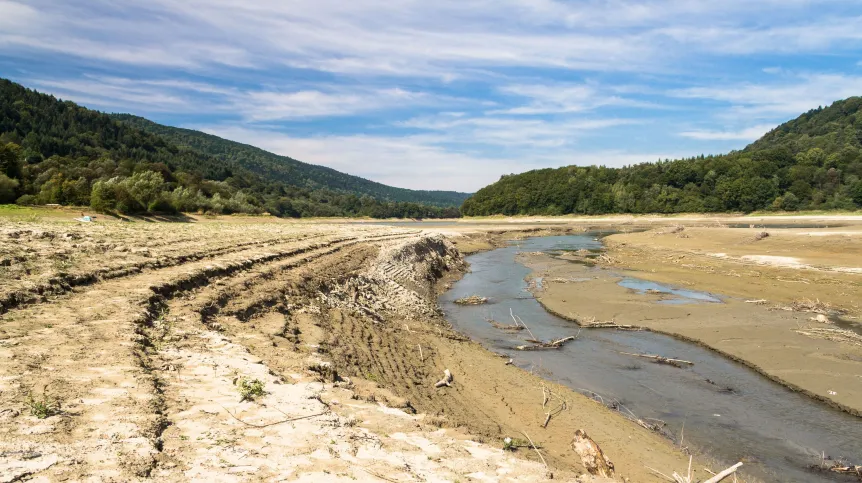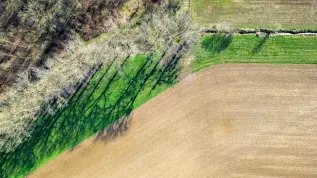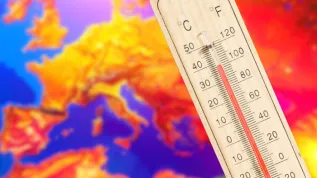
Drought has been with us every summer for several years. We are still doing too little to counteract, says hydrologist and Vice-President of the Polish Academy of Sciences, Professor Paweł Rowiński. He also emphasises that the awareness of water deficit and the need to care for its resources is growing.
In mid-May, the Deputy Director of the Polish Centre for Hydrological Protection at the Institute of Meteorology and Water Management - National Research Institute, Grzegorz Walijewski told PAP that since 2015 we have had a permanent drought in Poland that has been increasing its range. It is a meteorological drought that later turns into an agricultural or soil drought.
'The current hydrological situation of the country is very difficult. In fact, we can talk about a very high water deficit in the soil in the whole country', Vice-President of the Polish Academy of Sciences, Professor Paweł Rowiński emphasises in an interview with PAP. The situation is particularly difficult in the Polish Lowlands, for example in the basin of the Middle Warta in Greater Poland. The hydrological drought affecting the region is characterized by a decrease in water levels in rivers below the long-term average values.
Professor Paweł Rowiński mentions a disturbingly low soil moisture in Poland. On the scale of soil moisture from 0 to 100 percent, where 100 is the highest soil water saturation, in many places in Poland it has now dropped below 30 percent. 'In most parts of the country, these moisture deficits are significant. This may mean lower crop yields or quality, and thus - food prices may increase', the scientist says. The data on soil moisture level in Poland are available on a special website of the Institute of Meteorology and Water Management: https://stopsuszy.imgw.pl/wilgotnosc/.
Rowiński warns against uncontrolled larger scale irrigation of the fields, because then groundwater is used. And it should be a reservoir that we can use as drinking water. Irrigation should be targeted and at the root, like in Israel. This way, water is used very efficiently and not wasted. 'We do not know how much water we use in Poland for irrigation. This area is not fully controlled by the state', he says.
One of the reasons for the drought in Poland is the global climate change caused by man, Professor Paweł Rowiński points out. 'It is simple physics. Since the beginning of the last century, the temperature in Poland has increased by 1.7 degrees Celsius, the results of which include higher evaporation', the expert explains. Higher temperatures also in winter mean that we have less snowfall.
'And snow is an excellent reservoir of water', he notes. Climate change also causes long periods without precipitation. There are also more and more frequent heavy rains that cause the threat of sudden flooding. 'After a drought, a flood can follow. This way, we have crisis after crisis', he says. For about 7 years, there has been a drought in Poland every summer. 'In the 1980s, we only had to deal with it every few years', he points out.
Climate change is not the only cause of drought in Poland. 'Another problem is that Poland is essentially located in a water deficit area. The reason is simple: we are far from the ocean and the moisture that flows over Poland mainly comes from the Atlantic Ocean', he explains. On the other hand, in Poland there is a system of mountain ranges that does not retain moisture from the ocean.
What can we do to make droughts less severe? The expert points to water retention in places where it rains. For years, 6.5 percent rainfall water has been detained in Poland, and for example in Spain it is 50 percent. According to Rowiński, Poland's retention potential is about 15 percent. 'This means that we still have a lot to do and these processes should be accelerated. All climate forecasts show that the drought will continue to affect us in the future', he warns.
Professor Paweł Rowiński says that in previous decades Poland made a lot of mistakes regarding water management. Instead of retaining water, it was disposed of. Field melioration was carried out on a large scale.
"For some time, however, the awareness of water deficit Poland has been increasing. The problem is discussed in the media. People are beginning to realize that water is a resource that should be saved. We should start with saving it', he emphasises.
According to the Vice-President of the Polish Academy of Sciences, dealing with the problem of water management should be a priority and a national issue that should be handled not only by the responsible ministry. It is also important to prepare engineers specialising in water management, because we still do not have enough of them. 'A lot remains to be done from the system side', he notes.
Water can be retained in a number of ways and there is still a debate on how to do this. Rowiński points out that the best solution would be dispersed retention: many ponds, green areas between arable fields. Numerous plantings are important in cities, he says. In his opinion, a lot is happening in this matter, but these changes are still taking place too slowly.
When asked whether water retention is expensive, the expert says that such investments will pay off quickly. 'Appropriate solutions can limit drought, which, after all, translate into losses. They also prevent urban floods, which also cause damage', he points out.
When asked about the coming months, Professor Paweł Rowiński says that we should expect them to be quite dry. The rains forecasted in the near future will be short rather than spread over a longer period of time, which would ensure adequate soil water levels.
PAP - Science in Poland, Szymon Zdziebłowski
szz/ mir/ kap/
tr. RL













